Christopher McKitterick's Blog, page 3
July 6, 2016
More ADHD Ableism
Articles like this piss me off to no end. Sure, I understand the danger of prescribing drugs to children. Heck, making kids sit quietly in a classroom all day is a ridiculous notion. If we really want to solve classroom disruptions, better than prescribing ADHD meds to bored kids, let them run around outside instead! Allow them creative outlets for their energy! Give them one-on-one tutors to ensure maximized, personalized learning!
But short of paying for that kind of public service (hello, anti-taxxers), I doubt we’ll clearly identify who’s really suffering from ADD or ADHD in childhood, or who’s just a bored kid with too much physical and creative energy to submit to the mind-deadening boredom that comes with school as it is today.

However, kids aren’t the only ones dealing with the disorder. Adults benefit from ADD and ADHD medications, too - perhaps even more so than kids.
I wasn’t diagnosed with ADD until my 40s, and taking Adderall has made all the difference in my health and happiness. Ask anyone who knew me before-and-after.
Before medical treatment, I’d struggle with trying to track, say, a dozen or more trains of thought running simultaneously through my mind... but, after starting the meds, it’s down to just a few threads of attention - or even just one, when I’m really involved. The difference between medicated and not-medicated is NIGHT AND DAY. (I take the bare minimum that’s medically effective to avoid developing physical resistance, and to easily clear my system over, say, a frustrating weekend of not taking any meds.)
Sure, the appetite-suppressant side-effect is real: I need to watch the clock to know when it’s time to eat. But when I think about eating, I realize I’m hungry. With kids, that’s probably more of a challenge, so they probably need a reminder to help them remember when it’s time to eat... but do you know any kid on ADHD meds who doesn’t have a smartphone close at hand? There’s apps for that. Better needing to remember when to eat than to go through life with the kind of serious disabilities that come with untreated ADD or ADHD.
Do the ableist a-holes who self-righteously decry “addiction” to ADHD medication say the same thing about heart meds for those in danger of heart attack? Insulin for diabetics? Hearing aids for those who need them? Eyeglasses?
If you can’t do the research, writer (that is, interview those most affected by the topic), talk about something you know or STFU.
Okay, I guess I have some feelings about this. /rant
[[MORE]]EDIT: Need to add this comment by “Heather!” that showed up right after I posted:
First of all, I just need to address how ridiculous it is to conflate ADHD symptom relapse after medication cessation with dependency and addiction. ADHD is a developmental disorder with biological origins in the pre-frontal cortex. Some people’s brains eventually catch up developmentally by adolescence or adulthood, some never do. Medications control symptoms by helping the brain function like normal brains function. Like other developmental disorders, there is no cure for ADHD, and medications are not going to make the brain normalize. They are an aid, like insulin is for diabetics or glasses are for people with myopia.
If you quit taking a medication that controls symptoms caused by inefficient biological processes, those symptoms will return, which is what is happening in the anecdotes mentioned in this article. This has nothing to do with dependency. Research shows that ADHD medication is not habit-forming when taken as directed. In fact, medication treatment before adolescence significantly reduces the risk of drug abuse and addiction in people with ADHD.
Can you imagine someone complaining about the dependency and addiction potential of insulin because high blood sugar resumes with cessation in diabetic patients? That’s how ignorant this argument is.
Besides that, this article is overloaded with myths and unsubstantiated assumptions about ADHD diagnoses, treatment, and outcomes.
Russell Barkley, PHD, has devoted his career to studying ADHD since the 1970s, has authored many studies that are used by organizations cited in this article, and has actually read all of the research and medical literature written on ADHD since the 1700’s (yes, 1970's). He has addressed the myths perpetuated by the media, including all the myths in this article, over and over again:
“If you were to average across all of these figures, it appears to be that somewhere between about 1.5 percent and about 2.5 percent of school-age children are taking medication right now for ADHD. Now, you have to look at that figure in the context of how much ADHD is there. It’s the only way you can answer the question of over-medication, and that is, what’s the reference point? We know that approximately 5 percent to 7 percent of school-age children have this disorder. If we use the conservative figure of 5 percent, and we know that about 2.5 percent of individuals may be taking medication, there’s your answer. We don’t have over-medication. Only about half of all ADHD children are ever taking medication for their disorder.
“There is controversy about ADHD, I believe, partly because we are using a medication to treat the disorder, and people find that to be of concern. But there’s also concern because ADHD is a disorder that appears to violate a very deeply held assumption that laypeople have about children’s behavior. All of us were brought up believing, almost unconsciously, that children’s misbehavior is largely due to the way they’re raised by their parents and the way they’re educated by their teachers. If you wind up with a child who is out of control and disruptive and not obeying, that that has to be a problem with child rearing.
“We can thank Freudian thinking and Watson’s behaviorism, and other ideas that are part of our common knowledge, for making us believe that behavior problems are learned. Well, along comes this disorder that produces tremendous disruption in children’s behavior, but it has nothing to do with learning, and it isn’t the result of bad parenting. And therefore it violates these very deeply held ideas about bad children and their misbehavior.
“And as long as you have this conflict between science telling you that the disorder is largely genetic and biological, and the public believing that it arises from social causes, you’re going to continue to have tremendous controversy in the mind of the public.
“Now, there is no controversy among practicing scientists who have devoted their careers to this disorder. No scientific meetings mention any controversies about the disorder, about its validity as a disorder, about the usefulness of using stimulant medications like Ritalin for it. There simply is no controversy. The science speaks for itself. And the science is overwhelming that the answer to these questions is in the affirmative: it’s a real disorder; it’s valid; and it can be managed, in many cases, by using stimulant medication in combination with other treatments.
“Saying that we’re not sure about the safety and the long-term use of the stimulant medication is nice to say. But the fact is that we know more about the stimulant medications than just about any other medication
that’s given to children in medicine... All of the research we have indicates that these drugs are some of the safest that we employ in the field of psychiatry and psychology. That’s not to say that we know everything about them. But we know a lot more than we know about cough medicines and Tylenol and aspirins and other things that children swill whenever they come down with a common cold. Nobody asks those questions about those over-the-counter medications, yet we know substantially less about them.”
YES.
If you need to see yet another "OH NOES! ADHD MEDS IZ ROONING UR KIDZ!" article, here's what I was responding to: x
May 23, 2016
Robots dancing after the power comes back

Guess who came back to life after the power outage - these cute little robots!
Lightshow-lamp robot wakes
so other one does too.
They sing and dance
with their lights and their arms.
Little clock-robot smiles so hard
he forgets how to tell time
May 2, 2016
We Must Eliminate Intentional Ignorance Or Perish
The older I get, the more it becomes clear that most of humankind's problems stem from intentional ignorance: Choosing to hold onto problematic beliefs despite evidence that shows these beliefs lead to harm, or could, or when they're simply no longer useful or relevant and get in the way of building a better future.
If you know something causes problems for others or for our shared environment, yet you continue to support that harmful thing, you're not "following your heart," being moral, or such. You've become part of the problem. Traditions and heritage are not always good. They're history. It's okay if obsolete beliefs stay in the past.
Resist intentional ignorance. Don't be the problem. If you learn something that changes your perspective or challenges your beliefs, follow Theodore Sturgeon's advice: Keep asking the next question. When you discover that you were ignorant of the facts or of others' feelings, embrace the new thing you learned. Grow, become a better person. Be part of the solution. The better world you'll live in is yours, too!
Isn't that kind of the Golden Rule? That seems like a good one to follow.
But seriously, any super-intelligent, super-powerful, godlike being that wants to keep its people in ignorance is a slavemaster or malicious asshole. If Earth's god-worshipping religions are based on such beings, well, to hell with those alien jerks!
Sure, humans as a whole can be terrible monsters, but intentionally keeping us in ignorance isn't making things better. I'd only forgive them if they were to appear this afternoon and say, "Sorry, our bad. We've been reinforcing your ignorance and self-hatred for too long. Now that you're approaching the Technological Singularity, it's time you learned the truth."
 ...I mean, we're about to become really dangerous - not just to ourselves, but to the rest of the galaxy. If some awful group of tech-savvy industrialists or terrorists - or some gov't seeking ultimate power - builds an intelligent nanoweapon that turns Earth to gray goo, it's not just us that's wiped out. Those self-replicating machines could consume everything on Earth, float past the now-all-nanos atmosphere, between the planets, and into interstellar space. Mars? Nano-goo. Jupiter? Supermassive ball of nano-goo. Oort Cloud? All the planets in our part of the galaxy? Nano-goo. Everything they touch will be destroyed.
...I mean, we're about to become really dangerous - not just to ourselves, but to the rest of the galaxy. If some awful group of tech-savvy industrialists or terrorists - or some gov't seeking ultimate power - builds an intelligent nanoweapon that turns Earth to gray goo, it's not just us that's wiped out. Those self-replicating machines could consume everything on Earth, float past the now-all-nanos atmosphere, between the planets, and into interstellar space. Mars? Nano-goo. Jupiter? Supermassive ball of nano-goo. Oort Cloud? All the planets in our part of the galaxy? Nano-goo. Everything they touch will be destroyed.
 So keeping us down might make sense on a galactic scale. But if that's the case, just TELL US it's in everyone's best interests to keep humans down until we're not so dangerous. TELL US that we're simply too monstrous in our mental composition to be allowed to progress. TELL US that we need to grow up, eliminate our bigotries and hatreds and other personality flaws, before we're allowed to keep moving into the future.
So keeping us down might make sense on a galactic scale. But if that's the case, just TELL US it's in everyone's best interests to keep humans down until we're not so dangerous. TELL US that we're simply too monstrous in our mental composition to be allowed to progress. TELL US that we need to grow up, eliminate our bigotries and hatreds and other personality flaws, before we're allowed to keep moving into the future.
Because humans will do it regardless, and then what? They'll just wipe us off the face of the planet before we're too dangerous? That's terrible resource management. If there's anything worthwhile in the human species, show us the error of our ways and help us cast off our inherited memes and epigenetics. Help us learn how to be better people.
I have an even better idea: Why not just fix our problems ourselves? Why don't we as a species work on becoming better people so we don't need to worry about theoretical godlike aliens exterminating us. If there's no such thing as godlike aliens, why in the ever-loving hell do we hang onto obsolete and harmful memes from our ancient past? It's like someone with peanut allergies continuing to gobble bags of peanuts, fully aware that the next mouthful might be their last. If Earth holds the only intelligences in the galaxy, we have a responsibility not to exterminate ourselves.
Be part of the solution, not part of the problem.
March 8, 2016
Losing My Religion
I just realized that losing my religion as an early teenager led to a
lot of troubled times throughout my teens and even into my early 20s.
I'd actually believed this religious stuff before then. I'd been
raised as a Christian, and everyone I knew was a church-going Lutheran
or Catholic (though the latter was eyed with suspicion), with a couple
Evangelical Free friends. As I begin drafting this late at night, after
pondering this article (about how Religious children are meaner than their secular counterparts) and this debate on the Facebooks,
I can clearly recall being really emotionally moved by hearing certain
sermons or reading stories about Jesus and salvation through love and
sacrifice. About how, after He came along to burn down the authoritarian
patriarchy, we could throw away all those old hateful bigotries and
prejudices, and look forward to a utopian future based on love - if only
everyone would just believe in Him!
What ruined this for me was when my confirmation teacher forced us to
say that the unbaptized go to hell. (It was a fundamentalist strain of
Lutheranism that no longer exists, closest to the Missouri Synod.)
"What
about babies born in areas where they could never have heard of Jesus?"
I asked, trying to fit this logically into what I'd studied about this
religion's eponymous founder.
"It's tragic, but that's the Lord's law," she said.
This
bore no relation to anything I had come to believe about Jesus, or the
very foundations of what I believed Christianity to be. So it couldn't
be right. But this religious teacher - and the pastor's wife
embodying the Church itself! - was insistent this irrational notion was
true. When I asked my Mom about this, she said to do what I was told (ah, the
underlying virus of religious authoritarianism) and "just say the damn words!
You don't have to believe them."
But if that were true, what was the point of the Church (in its
broadest sense), the most-massive and enduring undertaking in all human
history? If we simply recite the words but don't believe in them, how
can we call it "faith"? More importantly in the societal sense, if we
don't need to believe what we're told or what we say, what's the purpose
of organized religion at all?
The existentially horrifying part of all this is that seemingly everyone in America (where 83 percent identify as Christian)
was part of a conspiracy of fear ("You'll burn in Hell for eternity if
you're a disbeliever!"), or else consciously trying to suppress reality -
and trying to infect the minds of their children with this mind-virus.
So it seemed that either everyone was aware of the lie and complicit in its perpetuation, or they were dangerously out of touch with reality,
allowing fear to control their minds so they could accept blatant
untruths, or some mix of scary-unhealthy world-views. Or all of these.
So
on that day, like the clouds parting for the first time to let sunlight
illuminate what used to lurk unseen in the shadows, it became lucidly
clear that my faith in the teachings of Jesus as told in what I'd
thought of as historical
documents bore no relevance to what humans had hammered into doctrine.
Worse,
what if this thing that had consumed so much of human creativity and
ingenuity over the millennia had merely been a tool for authoritarian
oppression devised by men seeking to control a populace who appear
willing to swallow nonsense and spout things they don't even believe?
And who continue propagating the lies and delusions, forcing their
children also to blindly obey?
This was terrifying. Remember the movie THEY LIVE?
It felt like that, as if I were surrounded by threatening aliens. How
could the people around me not see them? Certainly pre-teen me couldn't
be smarter or more insightful than the vast milling masses of adult
church-goers. So were they collaborators in some vast alien conspiracy
to take over the minds of children?
Which is worse?
Regardless, this is the moment I point to, when I lost my religion
and my faith in anything. From here on out, unless I see verifiable
evidence of something bandied as truth, or morally right, or real, I
disbelieve. Just because some authority says something is so doesn't
mean a thing, because clearly authorities were fallible, all the way
back to the dudes responsible for founding the early Christian church -
and obviously those who created early superstitious religions were
wrong: Not only are we taught this by the leaders we're told to believe
and obey, they're falsifiably incorrect. I mean, only the most protean
animistic religions bear any relation to the real world, because we can
see how lightning causes fire or how animals behave in the face of
storms. Only the philosophy-based religions seem to offer anything
useful to their practitioners, yet look at how even Buddhism has been twisted by the patriarchy.
Before
this revelation, I had seriously considered pursuing a career (or at
least an avocation) in
religious work. During my years of crisis, I spent a great deal
of time and energy researching religious systems, seeking to piece together a core
set of
universal and rational beliefs in an attempt to construct a
religion relevant to our times. Something I could believe in, something that might
help make sense of a world that otherwise seems intentionally insane.
Nothing came of the search except a deeper appreciation of the universe. I've never lost my spiritual connection to nature - the
animals who've inhabited this world far longer than we've built cities,
the planets where such beings can live, the stars that provide the
energy to fuel our lives, and the rest of the universe, which provides
the soil for everything else to grow.
But that wasn't enough
to soothe my existential angst. I
suffered pretty traumatic and turbulent teenage years, and barely made
it out of then alive. Because this is also when I lost faith in human
beings. I mean, if the single greatest communal effort to build and
maintain something in all of human history - the Church in its diversity
of manifestations - was either a lie, or a delusion, or a shield
against fear, how could we hope for a better future? If people choose
ignorance, accept on faith things that are verifiably untrue, and oppress those who do not believe mutually incompatible articles of faith, there's no hope for a long-term human future.
I
just now also realize that my rejection of Christianity (and organized religion in general) is probably a big part of why my Mom treated me so
much worse than she treated my brother. For whatever reason, and despite
her powerful intelligence and terrible childhood, she was deeply
religious. She's the one who forced child-me to go to church every
Sunday and holiday, and to attend Sunday school and Confirmation classes.
When I was an adult, she forwarded me so many hateful, bigoted, racist
spam-mails that I had to filter out most of her messages (once such capabilities appeared). These were indications that she was probably
one of those hateful Christians who now rule the American
discourse. She probably hated me for rejecting her God, and her Church (she did every so often tell me that she hated me). Despite her strong advocacy of feminist concerns, I
know she hated how I reject out of hand all forms of authoritarianism. She was always a
leader in everything she did - work, church, friends - which was an
outstanding trait for a woman in the 1970s. But it was still
authoritarianism, and she still served the patriarchy.
So when
my brother told me at mom's funeral that my childhood experience under
Mom was nothing like his, it makes sense. He went to church, and Sunday
school, and Confirmation. He accepted authoritarian rule. He continued
to say the words that he was supposed to say; he might not have believed
them, and I know that in his heart he was not obedient to authority,
but he pretended to be. And that seems to be all that really matters to religious extremists.
To Mom, my brother was one of Them,
or at least a willing conspirator, whereas I was loud and determined in my
rejection of the entire enterprise. Burn it all down and start fresh!
As
a boy standing alone in the dark beside my telescope, I remember
calling out to the starry sky, begging benevolent aliens (for what other
type would visit such a flawed world yet not eradicate us like vermin?)
to take me away. I drew spaceships that I could imagine piloting far
away. I dreamed of exploring the moons of Jupiter alone, far from the
insanity of Earth, of the coming changes that would transform our
society and ourselves into something worthy to endure into the future. I
wrote stories about these things, and the fall of adult civilization,
and imagined a world where I could bear to live.
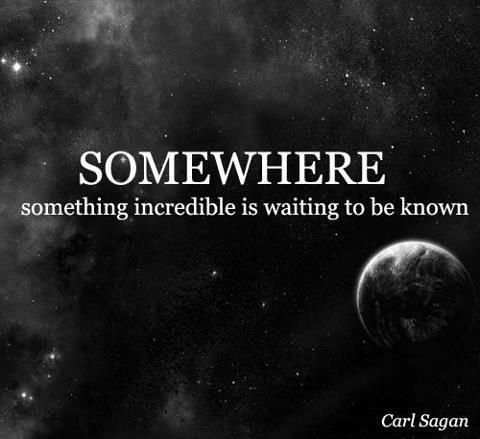
See, this
was also the time during which I discovered most of my friends and many
of my closest relatives had endured horrifically abusive childhoods.
What kind of species tortures their young? The same kind that holds them down and injects cognitive retro-viruses into their brains.
I
spent a great deal of my teens and early 20s in deep depression,
suicidal on occasion but mostly fearless of death, because how could it
be worse than having to dwell in the shadow of the monsters who rule our
world, whom we must obey - or at least pretend to obey? I've never been any good at pretending such things.
Under such rule, there can be no bright future. There can be no utopia.
Ever since I discovered it, science fiction
has served as my primary existential comfort, and it remains so. SF needs no gods, and if it has religion, it can
illuminate what's wrong with how we do it. It offers visions of futures
where things can be different.
It taught me that change is good.
That it is, in fact, necessary for growth, healing, learning, and
everything else that is positive in our lives. If we're not changing,
we're dying. (Huh, I just realized something else: This is what The Galactic Adventures of Jack & Stella is all about, and where its themes come from.)
Only
by finally letting go of desperately clinging onto the plague-ship of religion
was I able to restore my faith in humankind. Only be letting go was I able to imagine futures without hate or bigotry, where we
can build something instead of expend all our energy dragging along the toxic casks from our
past.
I sometimes joke that my religion is the Church of Science Fiction.
Looked at in the right light, SF does serve that purpose better than any church I've ever encountered, in that it also offers stories about
the Big Questions, about our origins and our ultimate end, what's right
and wrong, transformations and transcendence. It's a space where we can
identify flaws in our world today and envision possible
futures where those things have either gotten worse or where we've
solved them. It needs no gods but those within us and around us and illuminating the sky. It does not demand faith; it rewards knowledge and
imagination and creative re-envisioning. Like science itself, it
questions everything and accepts nothing that cannot be verified. Best
of all, it's a community and an ongoing conversation. It's a family.
And SF is more true than any religion could hope to be.
Organized religion almost killed me. Science fiction kept me from falling into the abyss. I survived to become a science-fiction writer, a teacher of SF literature, and - like long-time friend and SF writer Frederik Pohl - a science enthusiast.
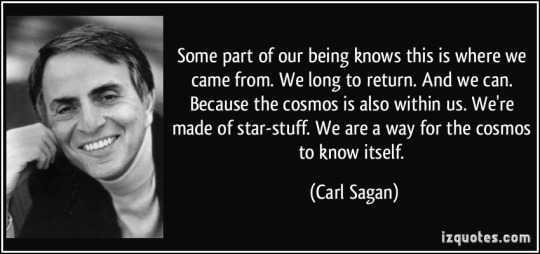
The only way our species can
survive is to transcend as a whole the self-perpetuating, outdated, and
damaging authoritarian structures we drag along from our past, which hold us back from reaching for the future. Science
provides the tools and methods to determine what needs to be changed,
and science fiction provides the safe laboratory where we can
test-run alternate visions of ethics, societal structures, and an
infinity of other things, including ourselves.
So, yeah, if I retain any semblance of religion in my personal life, it's definitely science fiction.
January 3, 2016
What a difference the right eyepiece makes!
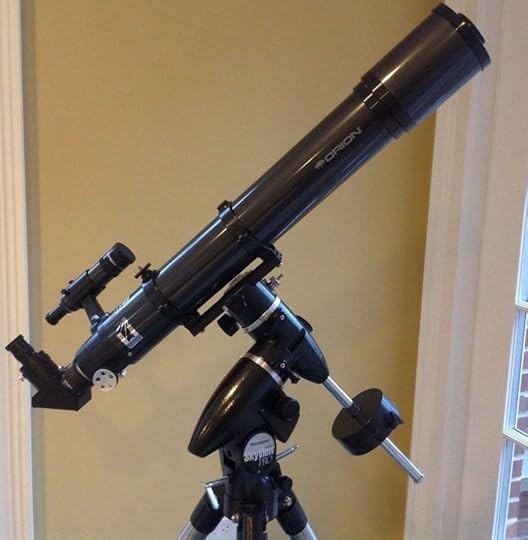
So why buy such a thing? For one, I already have two wonderful reflectors. But they're both pretty large to lug around (90 and 150+ pounds). I also knew (academically) that, compared to a good refractor, the quality of the image in a reflector suffers because the secondary mirror (and holder) get in the way of the incoming light, and at high powers produce issues at the edge of the field (except in very expensive, multi-optic hybrid designs). On the other hand, a cheap refractor's image only suffers when it disperses the light passing through its lens into various color components, because those different wavelengths of light usually separate, like this:
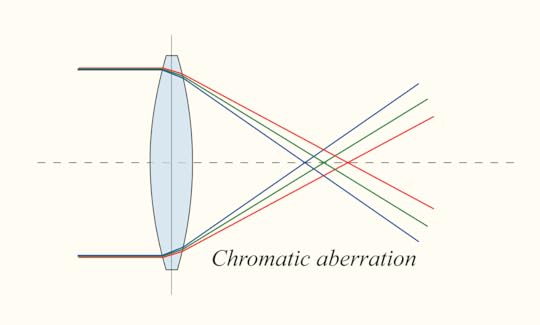
It turns out that the refractor I bought is pretty kick-ass. The optical design of my 'scope is an "apochromatic ED." Unlike an low-cost but decent "achromatic" refractor, an apo converges all the frequencies of light at the same focal point (or close enough for the human eye). Less expensive "achromatic" telescopes do not use the best glass, failing to converge blue-through-violet light very well, so that range of light appears as a fuzzy halo around the object you are viewing (and usually suffering in sharpness, as well). This is less of an issue with dim objects like globular clusters, nebulae, or galaxies, but it becomes a nuisance with brighter objects like the Moon, stars, and planets. Also, the colors dispersed are lost information, subtracted from the resolution of the object, thus reducing the image quality, thus defeating the entire point of a refractor over a reflector.
To combat these issues, an apochromatic objective uses multiple glass lenses mated together to converge the various frequencies of light, thus managing the refractive dispersion through the elements. Sometimes apos use rare materials (like fluorite or other low-dispersion glass) in the lens composition. As you might imagine, these are expensive propositions - simply adding a second or third lens doubles or triples the cost, and if the glass used costs, say, 10x as much... well, you get the idea. The very best, observatory-quality refractors use a combination of both strategies, and the price for such an instrument is astronomical (ba-da-boom, tsch!).
Mine achieves apochromatic quality by using two lenses, one of which is made of extra-low dispersion (hence the "ED") FPL-53 glass (made only in Japan) to provide super-sharp images with no false color. Mine isn't the top of the line, but it's pretty close. Sure, if it used fluorite instead of FPL-53, it might be slightly better. Or if both lenses were that kind of glass, or if it were a triplet (three lenses). But telescopes like that are MUCH more expensive, costing around $3000 - I got mine, complete with a dual-drive equatorial mount, for about $600. But why? Objects in my 'scope are free of false color (chromatic aberration), sharp, and don't lose any light to dispersion, either.
I've used this 'scope for a couple of years now, mostly because it's so convenient to drag in and out of the house, but never knew all it was capable of. It required a team effort. The real eye-opener for me was how much difference a great eyepiece makes. I've always used decent eyepieces, but these new Explore Scientific eyepieces are frakking amazing! Here's my new case for my 2" eyepieces (the new ones are those with yellow-green spots on the side):
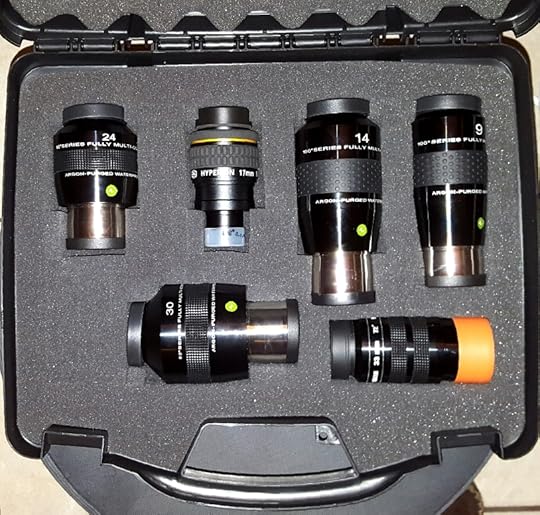
HOLY WOW! The widest field-of-view eyepiece I've ever owned is my William Optics Swan 33mm (it's the one in the photo with the orange bottom cap). It offers 72° apparent field of view (how wide an angle the view in the eyepiece looks to you, the observer), which I thought was pretty amazing. It's still my lowest-power eyepiece (magnification comes from dividing telescope focal length by eyepiece focal length - my 100mm has a focal ratio of f/9, meaning 900mm focal length), offering up a magnification of 27x in this 'scope, with a true field of 2.7° of the sky (about 5 times as wide as the full Moon). Pretty nice, I thought! Sure, the quality of the image at the edge is imperfect, and the sharpness could be better, but it was as nice as I ever used.
Enter the 30mm Explore Scientific 82° wide-field eyepiece of joy.
I started last night's observing session with the Great Orion Nebula, directly overhead in Kansas at around 11pm. The first eyepiece I dropped into the focuser was the most massive once I've ever used, a 30mm with 82° (apparent) field of view. The huge swath of sky it provided was simply astounding - especially when it caught a meteor streaking across the belt of Orion! I didn't bring any astrophotography gear (I was just in my front yard, after all), but here's a nice drawing of about how it looks to the naked eye in a telescope of about this light-gathering power:

This puppy is about the size of my fist and weighs 2.2 pounds (!). Its field of view is so ultra-wide that I had to move my head around to get the full view, making the experience feel like I was looking out through a spaceship's porthole rather than through a telescope eyepiece. Even though the magnification is greater (30x), its true field was wider than with the 33mm! It also has a very large 6.7mm exit-pupil(how wide the cone of light coming through is), which is even larger than some eyes can dilate. It's difficult to explain just how amazingly immersive such a view is until you try it.
Other cool features of this eyepiece: It's O-ring sealing and argon-purged. This makes it completely waterproof, prevents internal fogging, keeps the interior dust- and fungus-free, and makes it easier to clean (no risk of cleaning solution getting trapped inside). It'll stay clear for a lifetime - guaranteed. Its 21mm of eye relief provides unvignetted (no darkening around the edge) views a full inch beyond the lens closest to your eye - this is not only great in general, but makes it easier for eyeglass wearers to observe without removing their glasses. Of course, doing so would mean missing out on a lot of the potential field of view. Its six-element optical design uses low dispersion and high-refractive-index lenses (same benefits as in a telescope's objective) in four groups. All the lens surfaces are fully multi-coated as well, and the lens edges are blackened to improve contrast. All of this adds up to the highest contrast, highest resolution, sharpest resolution, and flattest ultra-wide field of view I've ever seen.
LOVE
Then I moved to the next-smaller Explore Scientific eyepiece, a 24mm (also 82° FOV), which provided 38x and a true field of view of 2.2°, so wide that even the hugely wide Orion Nebula only took up the center of the image. AMAZING! I spent some time with this eyepiece before moving to the next-higher-magnification unit....
Enter the Explore Scientific 14mm 100° apparent-FOV eyepiece. This puppy is just about as large as the longer-focal-length unit (almost 2 pounds), though with a narrower and longer barrel to accommodate nine optical elements of rare-earth glass. Though 100 doesn't seem that much larger than 82, those extra 18° provide nearly 50&percent; wider FOV. So the 64x magnification this one provides still offered up nearly 1.6° of true field - that's three times as wide as the full Moon! This is truly astounding to someone whose prior experience is mostly having used what I thought was a nice Plossl 24mm with 52° FOV - that's less true FOV at much lower power.
So, I asked myself, what will the highest-magnification Explore Scientific unit offer? It has 9mm of focal length, providing 100x... but because of the huge field of view, this high power was still a full degree - twice as wide as the full Moon! I had no idea that a high-power eyepiece could be so comfortable to use, or provide such a "spacewalk" sensation, or offer up such crisp, high-resolution to-the-edge views. Man, now I wish I'd ordered the mega-power 5.5mm that was also on mega-sale! It would have provided 164x while still offering a FOV slightly wider than the full Moon! *boggles mind*
At the end of the night (pretty late by now - after 1am, I'm afraid), I noticed that Jupiter was just starting to peek out from the trees, so I thought why not? Sure, I would be looking a lot of humid atmosphere, over the neighbor's house, and through branches, but it's my fave planet. My apo plus 9mm SOOPER EYEPIECE did not let me down. Four Galilean moons and stormy Jupiter all served up as nice as through a cheap eyepiece looking directly overhead. Just wow.
Oh, and surprise! All these eyepieces turn out to be parfocal, meaning you don't need to do significant re-focusing when shifting from one to the next. That's a major bonus when swapping eyepieces, especially when moving to high magnifications (which also magnify your bumping the 'scope whenever you touch it), where you can lose an object and have to start over finding it at a lower power.
And the best part? We live in an age when you can get incredible eyepieces like this during online, pre-xmas sales for just a little more than the price of a so-so eyepiece (I bought all four for about the retail price of just the 14mm.
HOORAY SCIENCE
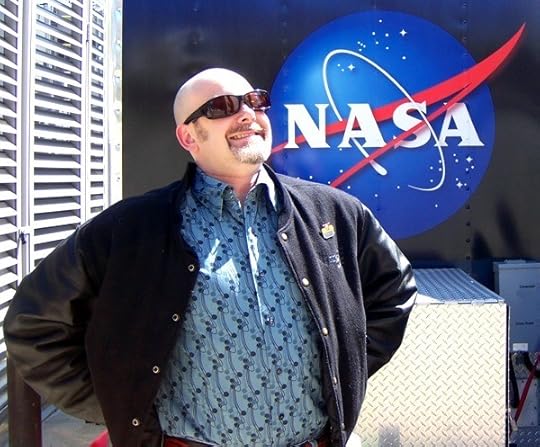
Chris
January 2, 2016
My tweets
December 30, 2015
My tweets
December 28, 2015
My tweets
December 25, 2015
My tweets
December 23, 2015
My tweets
Christopher McKitterick's Blog
- Christopher McKitterick's profile
- 31 followers



